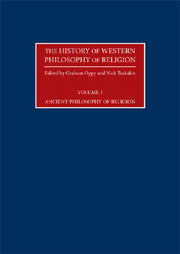Book contents
- Frontmatter
- Contents
- Editorial Introduction
- Contributors
- 1 Ancient Philosophy of Religion: An Introduction
- 2 Pythagoras
- 3 Xenophanes
- 4 Socrates and Plato
- 5 Aristotle
- 6 Epicurus
- 7 The Stoics
- 8 Cicero
- 9 Philo of Alexandria
- 10 The Apostle Paul
- 11 Plutarch of Chaeroneia
- 12 Sextus Empiricus
- 13 Early Christian Philosophers: Justin, Irenaeus, Clement of Alexandria, Tertullian
- 14 Origen
- 15 Plotinus
- 16 Porphyry and Iamblichus
- 17 The Cappadocians: Basil of Caesarea, Gregory of Nazianzus, Gregory of Nyssa
- 18 Augustine
- 19 Proclus
- 20 Pseudo-Dionysius
- Chronology
- Bibliography
- Index
10 - The Apostle Paul
- Frontmatter
- Contents
- Editorial Introduction
- Contributors
- 1 Ancient Philosophy of Religion: An Introduction
- 2 Pythagoras
- 3 Xenophanes
- 4 Socrates and Plato
- 5 Aristotle
- 6 Epicurus
- 7 The Stoics
- 8 Cicero
- 9 Philo of Alexandria
- 10 The Apostle Paul
- 11 Plutarch of Chaeroneia
- 12 Sextus Empiricus
- 13 Early Christian Philosophers: Justin, Irenaeus, Clement of Alexandria, Tertullian
- 14 Origen
- 15 Plotinus
- 16 Porphyry and Iamblichus
- 17 The Cappadocians: Basil of Caesarea, Gregory of Nazianzus, Gregory of Nyssa
- 18 Augustine
- 19 Proclus
- 20 Pseudo-Dionysius
- Chronology
- Bibliography
- Index
Summary
The thought of the apostle Paul (c.2 ce–c.64 ce) is perhaps the most important early source for the later development of Christian theology. This is because, although occasional pieces, the letters contain explanations, concepts, arguments, narrative fragments, metaphors, ethical teachings and references to practices important for the formation of coherent doctrines about human nature and its transformation, Christ's work, God's judgement and salvation, the character and futures of Jews and Gentiles and so on. The letters of Paul are the earliest Christian writings and predate the canonical gospels from decades to one-half of a century. Moreover, they were written before the epic-making changes that occurred with the destruction of Jerusalem in 70 ce and of Judaism as it had been known. Paul assumed that Judaism and God's temple would go on and understood himself as working as the missionary chosen to bring the message about Jesus Christ to the non-Jewish peoples. The teachings attributed to Jesus in the gospels do not appear or play any role in his letters. Rather, he develops a form of religion based on the role of Christ as an agent of human transformation and part of God's plans for the consummation of history. Thus interpreters have often said that Paul rather than Jesus was the founder of Christianity.
Scholars agree that the letters are the more trustworthy sources for knowledge of Paul and his teachings.
- Type
- Chapter
- Information
- The History of Western Philosophy of Religion , pp. 145 - 158Publisher: Acumen PublishingPrint publication year: 2009
- 1
- Cited by

